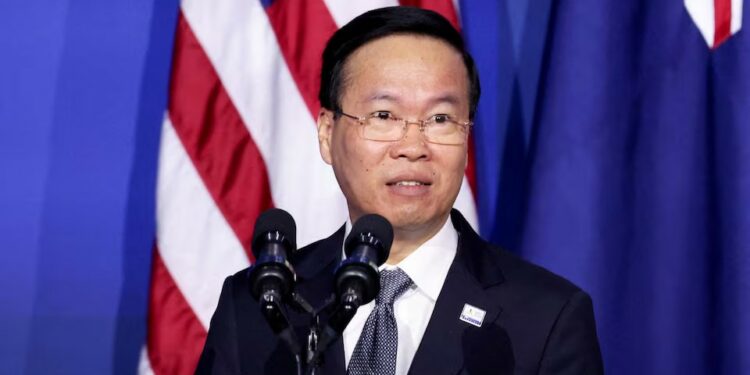President Vo Van Thuong of Vietnam has tendered his resignation, marking the end of his one-year tenure in office.
The announcement came following the acceptance of his resignation by the Vietnamese Communist Party, citing “shortcomings” that had reportedly impacted public opinion and tarnished the reputation of the party and the State.
According to a government statement released on Wednesday, President Thuong was found to have violated party rules, prompting the Central Party Committee, Vietnam’s top decision-making body, to approve his resignation.
Despite holding a predominantly ceremonial role, the president is one of the country’s top four political figures, making this resignation a significant development in South-East Asian politics.
The decision to step down comes amid a backdrop of political turmoil and a government-led anti-corruption campaign dubbed the ‘blazing furnace’.
Critics speculate that the campaign, aimed at stamping out corruption, may also serve as a tool for political manoeuvring within the ruling Communist Party.
President Thuong’s resignation follows the recent arrest of a former provincial head on corruption charges dating back a decade, during which Thuong served as the party chief in central Vietnam’s Quang Ngai province. Widely perceived as an ally of General Secretary Nguyen Phu Trong, Thuong’s departure adds to the series of leadership changes within the Vietnamese government.
The swift resolution of this political crisis hinges on the upcoming extraordinary session of Vietnam’s parliament scheduled for Thursday, during which deputies are expected to confirm the party’s decisions and potentially elect a new president. However, concerns have linger about the impact of repeated leadership reshuffles on business sentiment, particularly in a country heavily reliant on foreign investment.
News of President Thuong’s resignation sent ripples through the financial markets, with the Ho Chi Minh City stock exchange witnessing a nearly 3% drop in the first hours of trading on Monday. Foreign investors reacted by net selling approximately $80 million worth of stocks over the first two days of the week, according to Mirae Asset Securities.
Amid speculation about the trajectory of Vietnam’s anti-corruption campaign, analysts suggest that the removal of President Thuong could lead to a slowdown in policy and administrative decisions. Nevertheless, assurances have been made that Vietnam’s stance on key policies will remain unchanged, providing a degree of stability amidst the ongoing political uncertainty.



